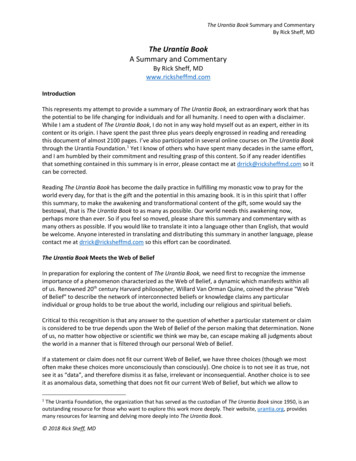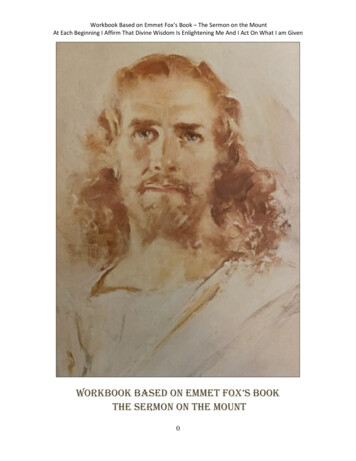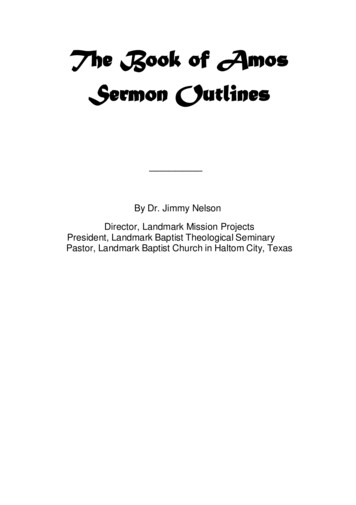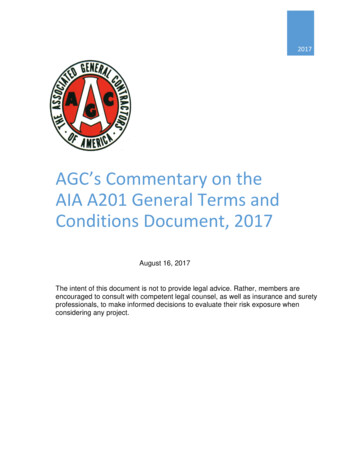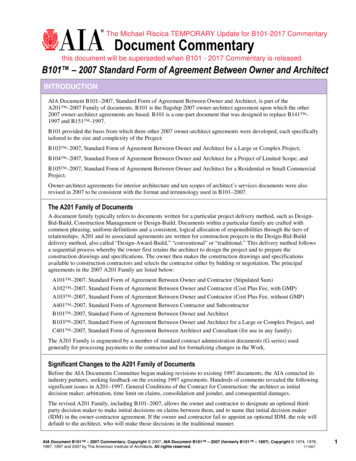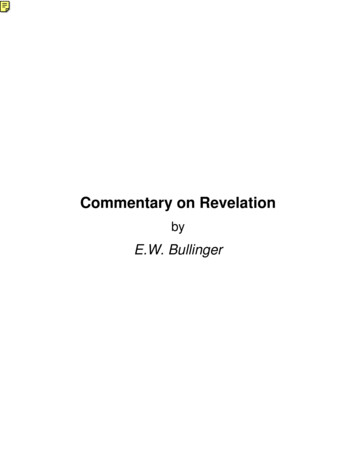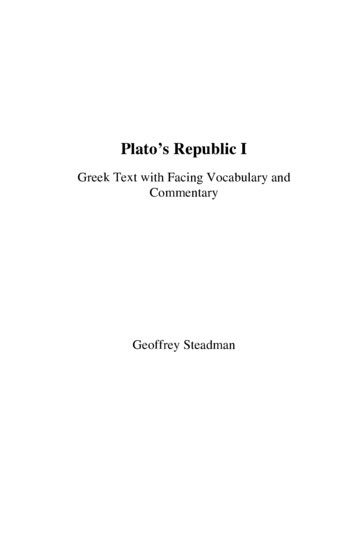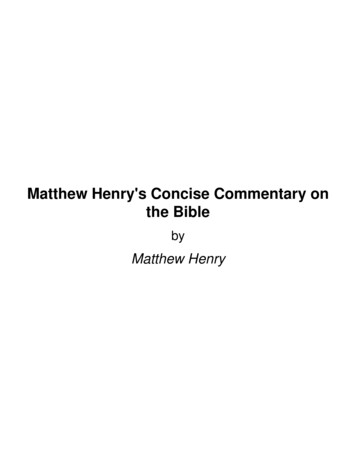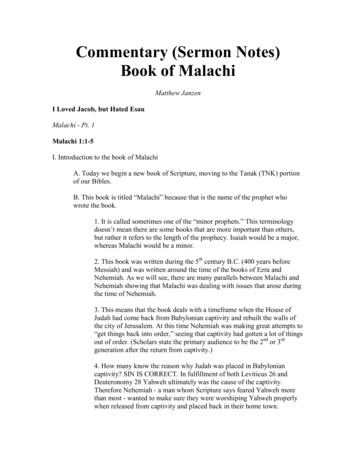
Transcription
Commentary (Sermon Notes)Book of MalachiMatthew JanzenI Loved Jacob, but Hated EsauMalachi - Pt. 1Malachi 1:1-5I. Introduction to the book of MalachiA. Today we begin a new book of Scripture, moving to the Tanak (TNK) portionof our Bibles.B. This book is titled “Malachi” because that is the name of the prophet whowrote the book.1. It is called sometimes one of the “minor prophets.” This terminologydoesn’t mean there are some books that are more important than others,but rather it refers to the length of the prophecy. Isaiah would be a major,whereas Malachi would be a minor.2. This book was written during the 5th century B.C. (400 years beforeMessiah) and was written around the time of the books of Ezra andNehemiah. As we will see, there are many parallels between Malachi andNehemiah showing that Malachi was dealing with issues that arose duringthe time of Nehemiah.3. This means that the book deals with a timeframe when the House ofJudah had come back from Babylonian captivity and rebuilt the walls ofthe city of Jerusalem. At this time Nehemiah was making great attempts to“get things back into order,” seeing that captivity had gotten a lot of thingsout of order. (Scholars state the primary audience to be the 2nd or 3rdgeneration after the return from captivity.)4. How many know the reason why Judah was placed in Babyloniancaptivity? SIN IS CORRECT. In fulfillment of both Leviticus 26 andDeuteronomy 28 Yahweh ultimately was the cause of the captivity.Therefore Nehemiah - a man whom Scripture says feared Yahweh morethan most - wanted to make sure they were worshiping Yahweh properlywhen released from captivity and placed back in their home town.
5. As we will see the people were very complacent in their relationshipwith Yahweh. Malachi receives a word from Yahweh that chastises thepeople in hopes of causing a return to the true genuine worship towardsthe Father.II. Malachi 1:1-5A. Verse 11. Oracle a prophetic speech of threatening character. The word is oftentranslated as “burden” in the KJV and carries with it the meaning of “thisis not going to be positive.a. In other words Yahweh is going to speak a word of rebuke to hispeople.b. True messages do not just carry exhortation and comfort, butalso rebuke. Yahweh rebukes His children when they go astraybecause He loves them. It’s similar to when Proverbs say “he thatspares the rod, hates his son, but he that loves his son, disciplineshim at the proper times.”2. The word of Yahweh to Israel through Malachia. Although this is the book of Malachi, we must understand thatMalachi is only an instrument in the hand of Yahweh.b. Yahweh is the one speaking, but Yahweh often uses means toperform his work in the earth.c. You may show someone something in this book and they mayrespond, “Yeah but that’s just the writing of a man.” This isincorrect. A man was the instrument through which Yahweh wrotedown His very words. The Scriptures are not from the minds ofmen but from the very mind of Yahweh. This is fundamental - ifyou do not get this you will be “wishy-washy” in your relationshipwith the Father.d. Apostle Peter informs us in his book (2 Peter 1:20-21) that noprophecy of Scripture comes from one’s own interpretationbecause no prophecy ever came by the will of man. Instead, movedby the Holy Spirit, men spoke from God. When you read Malachiyou are reading the voice of Yahweh.e. Take note before we move on that this book was written toIsrael, specifically the house of Judah. Judah, though separate from
the house of Israel were still called Israel because they stemmedfrom the same father - Jacob/Israel.B. Verse 21. Yahweh says He loves Judah, but they ask “How so?”2. Through this book we will see the very “prideful” attitude of Judah as awhole. Yahweh has done so much for them yet they fail to see what isright in front of their noses. In this case Yahweh has loved them dearly,yet they cannot see His love.3. We do the same thing today. Yahweh loves you and blesses you, yetyou ask him at times, “How have you loved me? How have you blessedme?” We get so caught up in the mundane things of life that we forget tosee the multitude of areas wherein Yahweh has blessed us. If you’re alivethat’s a blessing from Yahweh, but we take for granted that when we go tosleep we will wake up the next morning.4. Yahweh then goes on to remind these Israelites about Esau, the brotherof Jacob. If you remember with me back to this birth. Isaac and Rebekahhad two children here, twin sons. One named Esau (oldest) the othernamed Jacob (youngest). Esau’s name means “hairy” and Jacob’s namemeans “heel holder” or “supplanter.”5. The text goes on to say in verse 2 and 3 that Yahweh loved Jacob buthated Esau. Yahweh is here pointing out the people of Israel how that theirfather (Jacob) was the twin brother of Esau, and the younger of the two atthat. Yet Yahweh chose Jacob and passed over Esau. Yahweh chosenpeople came from the loins of Jacob/Israel and not from the loins of Esau.6. Does Yahweh really hate Esau? Some theologians attempt to bypassthis text of Scripture (and others that are similar) and say that it reallydoesn’t mean Yahweh hated Esau, it just means that he loved Esau lessthan Jacob.- When I look at this word hated in Hebrew (saneh) I get the ideaof hatred.- It is used in Genesis 37:5 of Joseph’s brothers feelings towardhim when he claimed to have dreams from God.- It is used in Leviticus 19:17 where Yahweh commands us not tohate our brother in our heart.- It is used in Deuteronomy 12:31 to speak of Yahweh hating allsorts of abominations done by the heathens.
- It is also used later in this very book (Malachi 2:16) where itstates that Yahweh “hates putting away” (some translations say“divorce”). We will get to this text in a future lesson.- When examining the Hebrew word it appears that one cannotcome to any other conclusion but that the word has to do with adislike and a disdain for someone or something else.7. The Aramaic Targum here reads “rejected Esau” and this is exactly howYahweh’s hatred for Esau was carried out. Yahweh chose Jacob, but didnot choose Esau. He accepted one, but passed over the other.8. People tend to have a problem when it comes to the Free Will ofAlmighty Yahweh. We act like we are the only beings who can makechoices and that Yahweh cannot. We think that Yahweh can’t choose tosave one and pass over the other based upon His Free Will. Yet it isYahweh’s will that is Freest of all, even more so than ours.- Our free will is limited. In other words we can will and desire onething, but if it “butt’s heads” with Yahweh’s free will our willloses every time.- This is why we sometimes pray for things that do not happen. Wemay have a sick loved one who we pray for to get healed and stayalive, but they die. We may pray for other things like a new job orhome, but nothing takes place. Why is this? Sometimes it is notYahweh’s will.- Yeshua understood this concept when he prayed before his death,“Father let this cup pass from me, but not my will but yours bedone.”- Yahweh can alter the nature or the will of a person or personsmaking them desire either good or bad. In Genesis 20 whenAbimelech (king of Gerar) took Abraham’s wife Sarah (thinkingshe was only Abraham’s sister) the text says (20:6) that Yahwehkept Abimelech from sinning against Him. Yahweh’s willoverpowered the will of a human being. He is Yahweh, we are not.9. Yahweh has the right to choose one and not choose the other (love,hate). We mustn’t accuse Yahweh of injustice for He is Yahweh. Hecreated all of creation and thus has rights over the entirety of creation. Ifhe chooses a Jacob, and passes over an Esau that is His right to do so.
C. Verses 3-41. This verse comments further for us on just how Yahweh hated Esau. Hedid not deal with Esau, but let him go about his business.2. From the time Jacob was born Yahweh always dealt with him as aFather. When Jacob would sin Yahweh would rebuke, discipline, and thuslove Jacob. This was not the case with Esau. Esau’s sins were not dealtwith in the same way. Esau was left to run free without discipline. Hismountains were turned into a wasteland and his inheritance was given tothe desert jackals (parallelism here same thing said twice.)3. Verse 4 mentions Esau by the name Edom. The first use of the wordEdom in Scripture (KJV) is Genesis 25:30 where Esau requests some ofJacob’s “red” soup. The text says this is why Esau was also called “Edom”a word which literally means “red.”4. Edom (Esau) speaks as says that they’ve been devastated and willrebuild their ruined places. However Yahweh speaks as well. Notice againthe free will of Esau is overpowered by the free will of Yahweh. Yahwehsays that they may build, but He will tear demolish. I ask you, if Yahwehwants to demolish a city that the Edomites built could the Edomites stopYahweh? Of course not, Yahweh’s free will is the most powerful in theuniverse.5. Verse 4 goes on to say that they (Esau/Edom) will be called a wickedcountry and the people that Yahweh has cursed forever. The word forcursed here is translated as “angry” in some translations.D. Verse 51. Yahweh tells the Israelites that their own eyes will see this take placeand it will show them that Yahweh is great (powerful) even outside of theborders of Israel.2. Yahweh’s actions will prove just how He loves Jacob/Israel and hatesEsau. These actions should shut the mouths of the proud in Israel. Theseactions should cause the question “How do you love us?” to cease.3. Yahweh would allow the Israelites to rebuild, and turn and follow Him,but not so for Edom. They would build, but He would destroy.III. Conclusion - If we have the mindset that Yahweh is not All Powerful; that He doesn’thave the right to choose one and not the other (allow one people to build and flourish, butallow the other to build and then He demolish) we need to repent from this thinking. Wedo not serve a weak, limp-wrested mighty one who bows to the will of man. We serve
one who is Almighty and has the power to do as He pleases. This includes loving someand not dealing redemptive with others.Bringing a Sick Goat to a Great KingMalachi - Pt. 2Text: Malachi 1:6-14I. Malachi 1:6-14A. Verse 61. Yahweh begins this section of the oracle with an opening statement tothe priests of the Southern Kingdom.2. He speaks of how there is honor in a “son to father” and “servant tomaster” relationship. This is to show how that although they call Yahweh“Father” and refer to Him as “Master” there is no honor and fear beinggiven.3. They are actually despising His name, and are doing so by their actions.Always remember that words alone mean nothing in our relationship withYahweh. You can say the most honorable things about Yahweh and singthe most beautiful songs about Yahweh, but neither of these meananything if there is no fruit of righteousness being produced in your life.4. Never get to the point where you fall further and further away fromobedience, but still think you’re okay because you come to church and say“nice” things about Yahweh. Yahweh is honored by our life, anddishonored when we honor Him with our lips but do not serve Him inwhat we do.B. Verse 71. Once again remember last week when Yahweh said “I have loved you”and Judah replied “Where have you loved us?” Here Yahweh has told thepriests they are despising His name and they ask “Where have we despisedyour name?” In other words they think everything is okay and are indenial of despising Yahweh’s name.2. Notice the answer Yahweh gives them. You would think the answerwould include what we would define as gross sins against Yahweh. I canthink of many things I would expect to come after this question is askedby the priests. But the answer is one we may not necessarily expect, yet itis of great importance to Yahweh.
3. The priests are presenting defiled food on the altar of Yahweh.a. Some translations read “polluted bread” here and it has beensuggested that this may be a reference to the “bread of thepresence” in the Tabernacle.b. I do not believe the actual “bread” is what is spoken of here butrather the word “bread” (translated “food” in the HCSB) is inreference to the animals being sacrificed upon the altar. This isprimarily because of the context of what comes in the verses thatfollow after this one.4. The priests then ask another question, “How have we defiled you?” Theanswer is when they say, “Yahweh’s table is contemptible.” The wordhere means “to be despised.”a. Now, note once again a vital point. There is no record that thepriests were literally speaking the words - “The table of Yahweh isto be despised.”b. The reference to them saying this is a reference to their actions.In what they were DOING they were SAYING that the table ofYahweh is to be despised.c. They were of the attitude that although Yahweh had given strictcommandments concerning what was and was not to be offered atHis table, it did not matter what they brought to offer beforeYahweh by way of sacrifice.5. All of Yahweh’s instructions are important. We would not think thatYahweh would bring up defective sacrifices as how His name was beingdespised but He did.a. We get it in our minds that if we speak out against abortion andhomosexuality we are spiritual. I believe both practices are sin, butthat’s not where sin starts and stops.b. You may be committing a sin in your life but do not even realizeit. You may think it’s not that big of a deal - “Surely it doesn’tdishonor Yahweh’s name (?)” you say or think to yourself.C. Verse 81. They were bringing animals that were blind, sick, and lame to offer upbefore Yahweh.
* NOTE: Sacrifice dates back to the fall of Adam and Eve where tunics of SKIN weremade (in this we see the teaching of substitute sacrifice), and then to Genesis 4 whereAbel brought of the firstling of the flock. It appears from studying Scripture that the pointof sacrifice was to give back to Yahweh a portion of what He had blessed you with. Thiswas a way in which the worshiper could
Malachi is only an instrument in the hand of Yahweh. b. Yahweh is the one speaking, but Yahweh often uses means to perform his work in the earth. c. You may show someone something in this book and they may respond, “Yeah but that’s just the writing of a man.” This is incorrect. A man was the instrument through which Yahweh wrote down His very words. The Scriptures are not from the minds .


